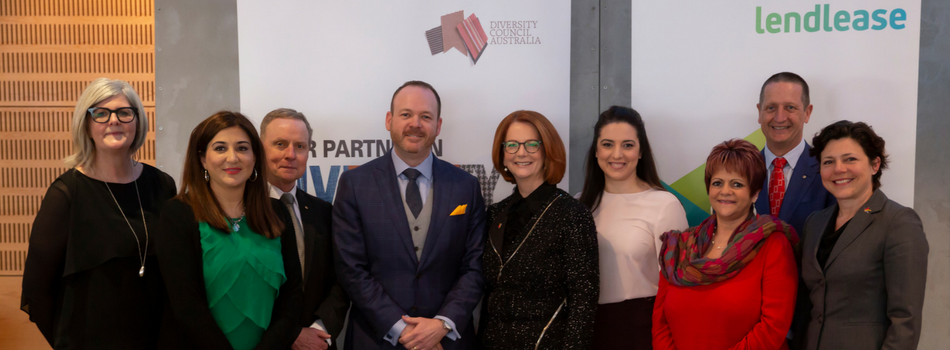The Hon Julia Gillard AC, Chair of beyondblue and former Prime Minister, said Australian businesses need to see diversity and inclusion (D&I) through a different lens, with mental health as a key focus. This is critical in a country where one-in-two of us will experience poor mental health at some point in our lifetime and more than 200 people, every day, feel so desperate they attempt to end their own lives.
Delivering Diversity Council Australia’s Anna McPhee Memorial Oration on Diversity & Inclusion, sponsored by Lendlease, in Melbourne today, Ms Gillard said many people experience mental health issues and diversity and inclusion at work need to be seen from their perspective.
“All employers see is a diagnosis”
In a heartfelt speech, she said, “While some are locked out of meaningful employment, the vast majority of these people work. They value work. They are highly productive. Yes, they may need flexibility, reasonable adjustments, time off from time to time. But who doesn’t? And too often, all employers see is a diagnosis, not the value of the richness of experience these people bring. Too often employers view mental health in the workplace through the lens of deficit and risk,” said Ms Gillard.
Underlining the predominance of mental health conditions in Australia, she urged the nation to think of, “The one in five working Australians affected at any given time by mental health challenges. The one-in-two of us who will experience poor mental health at some point in our lifetime. The one million Australian adults living today with depression. The two million with an anxiety condition. The more than 200 who, every day, feel so desperate they attempt to end their own lives. The eight a day who die by suicide. A terrible figure that is more than twice the national road toll.”
Ms Gillard highlighted programs like Heads Up, which help create mentally health workplaces. She also mentioned The Way Back Support Service for suicide prevention, and the #YouCanTalk campaign to increase confidence when it comes to talking about suicide, saying that while they are achieving results, they needed more support.
Changing Behaviours Everywhere
She went on to say, “We need to continue to build awareness and change behaviours everywhere that Australians work, live, learn and play; have governments invest more and differently; realise the potential of every dollar by eradicating waste, duplication, gaps and holes; and improve access to high quality services and supports so everyone in need gets them.”
DCA’s CEO, Lisa Annese, said greater workplace inclusion of people with mental health conditions will benefit everyone.
“We already know from DCA research that inclusion is good for business and for employees. Today’s Oration showed that workplaces can do more when it comes to mental health. It’s really all about creating an environment that enables people to manage their lives, and get the support they need,” said Ms Annese.

Chris Lamb, Group Head of Talent & Organisational Development at Lendlease who spoke on the panel at the event said employers have an obligation to understand the impact of their work environment on the mental health and wellbeing of their people.
“As business leaders, we must step up and demonstrate an active and long-term commitment to this issue which goes well beyond policies and frameworks. We are uniquely placed to serve as important role models, significantly influencing the culture of our respective organisations. Importantly, we can also drive meaningful action within our broader industries for safer, healthier and more inclusive workplaces,” said Mr Lamb.
Professor Ian Hickie AM, Co-Director, Health and Policy, Brain & Mind Centre, The University of Sydney, who also spoke on the panel agreed that workplaces play a key role in supporting individual and collective well-being and resilience.
“The two fundamental principles of good mental health are personal autonomy and social connectedness. The challenge for modern workplaces is the extent to which the work environments actively support staff to achieve both of these concepts,” said Mr Hickie.
Fellow panellist Georgie Harman, CEO, beyondblue said a mentally healthy workplace is one that includes workers who are currently living with a mental health condition.
“We will achieve true diversity at work when we focus not only on supporting the one in five with a mental health condition to stay at work and thrive, but that workplaces embrace the fact that they have a role in prevention and promoting the wellbeing of the entire workforce,” said Ms Harman.
Sonia Gangi, Registered Nurse working for the Victorian public health sector and fellow panellist said mentally healthy workplaces are built on positive culture.
“Managers and leaders play a key role in creating an environment that promotes well-being, where employees feel supported and valued. Workplaces can demonstrate an active commitment to mental health in many ways: providing flexible working conditions, developing people and management skills, offering emotional support to those who disclose personal information, and supporting well-being programs and initiatives,” said Ms Gangi.
